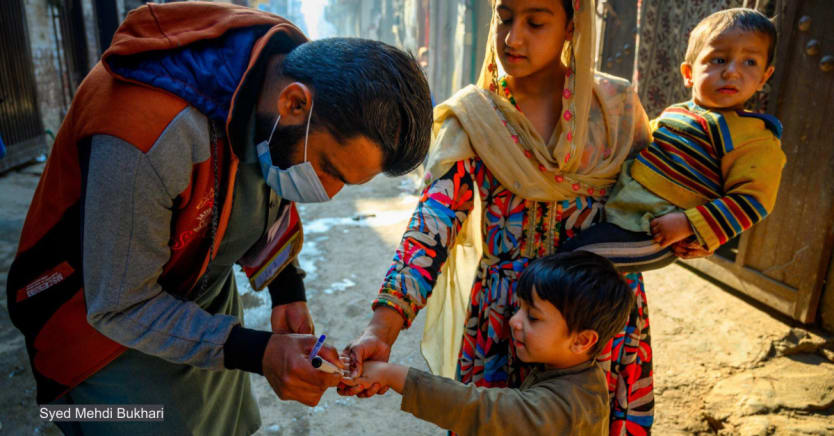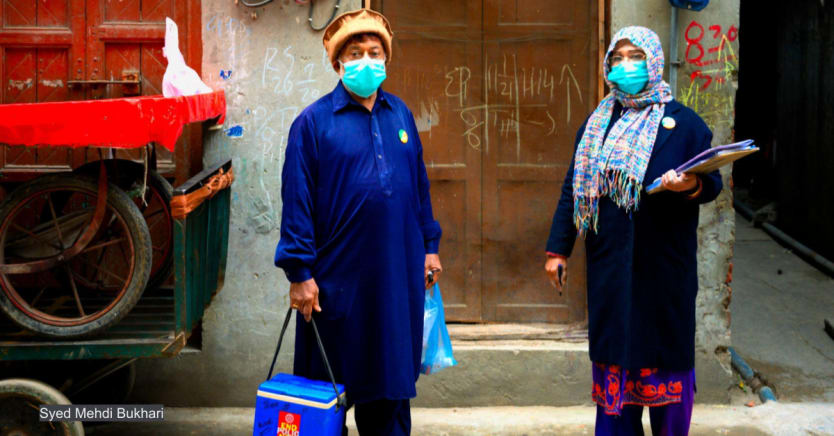Global health leaders plead for renewed investment in polio eradication

As countries around the world make plans to roll out vaccination campaigns for COVID-19, other immunization efforts have taken a hit due to pandemic-related restrictions, putting a serious dent in global health efforts.
That’s the case for the campaign to eradicate polio — a global coordinated effort initiated in 1985 by the global service organization Rotary International — which was temporarily scaled down in 2020 as social distancing measures were put in place, and resources diverted to fighting the COVID-19 pandemic.
According to the World Health Organization, failure to eradicate wild polio could lead to the disease coming back in full force, and result in as many as 200,000 new cases every year worldwide.
Further divestment from polio eradication campaigns will have severe consequences on at-risk populations, several experts told Devex.
“Polio eradication is an absolute priority,” said Dr. Rana Muhammad Safdar, director general at Pakistan’s Ministry of National Health Services, and former national emergency coordinator for polio eradication. “By no means, we should be in a situation where a program that was performing optimally, unfortunately had to cut its priorities because of the resource cutting.”
“If we do not eradicate polio in Pakistan and Afghanistan, in the next five to 10 years, we are going to find it all over the world.”
— Jude Tuma, technical officer, WHOThe impact of COVID-19
Before the COVID-19 pandemic hit, the world was close to eradicating polio. In August 2020, WHO declared the African continent as free from wild poliovirus, leaving only Afghanistan and Pakistan where the disease remains endemic.
Polio mostly affects children under 5. While it’s rarely fatal, it can infect the spinal cord and cause lifelong paralysis. There is no known cure for the virus, which means vaccination is the only path toward eradication.
In March 2020, immunization drives in Afghanistan and Pakistan were put on hold as COVID-19 hit. As a result, about 50 million children did not receive the vaccine in the early months of the pandemic, and polio cases reappeared in districts that were previously polio-free.
The campaigns gradually resumed beginning in June 2020, but countries are now scrambling to make up for lost time.
“If we do not eradicate polio in Pakistan and Afghanistan, in the next five to 10 years, we are going to find it all over the world,” said Jude Tuma, technical officer at WHO.
Lessons from the polio campaign
While COVID-19 put a serious dent in polio eradication efforts, the infrastructure deployed to fight the disease has been instrumental in the pandemic response. In several countries, community health workers assigned to the polio campaign switched to surveillance, contact tracing, and sensitization, going door-to-door to reach households in low-income or remote areas. Many of these workers are expected to support upcoming immunization efforts.
Michel Zaffran reflects on polio lessons and the job ahead
Before stepping down from his role, the WHO polio director hoped to oversee the launch of a new oral polio vaccine and help strategize the Global Polio Eradication Initiative. Speaking with Devex, he shares advice for his successor.
“The coalition and the collaboration around the response to COVID-19 has been tremendous,” Tuma said. The infrastructure developed for the polio campaign, including trained staff, laboratories, and coordination mechanisms, has been used to respond to a range of emergencies in target countries, from the Ebola response in West Africa to natural disasters, he noted.
When the pandemic struck, Pakistan and Afghanistan were reaching the last, and also most difficult stages of their immunization efforts. Having drastically reduced the number of infections — cases in Pakistan plunged from 20,000 in the mid-90s to 12 in 2018 — they were now targeting populations in hard-to-reach areas, some of them located in conflict zones.
They had drawn from the experience of India, which in the early 2000s tweaked its polio immunization program around grassroots communications in order to build trust with target populations living in informal settlements. By training community health workers and providing door-to-door services, the program managed to reach people in the absence of a functional primary health care system.
Pakistan launched its own community-based polio program in 2014, called the Continuous Community Protected Vaccinator program, followed by Afghanistan in 2015 with its Community Health Volunteer initiative.
Both countries adapted the approach to the local context, selecting local workers based on their level of access to local populations, and forging local partnerships with influencers, such as sports figures and religious leaders.
When COVID-19 reached Afghanistan, guidelines issued by the ministry of health regarding social distancing and public gatherings were ignored, said Mufti Shams-u-Rahman Frotan, a member of the National Islamic Advisory Group in Afghanistan, whose goal is to support efforts to end polio. “Religious scholars were the ones who educated people not to attend group prayers in mosques and if they do, to keep their distance,” he said. “That is when people took action.”

Fighting disinformation
Ensuring acceptance of the polio vaccine hasn’t always been easy and challenges undoubtedly remain. In Afghanistan, periodic violence against vaccinators continues, often fueled by community mistrust.
In March, three female polio workers were shot and killed as they worked to administer the vaccine in the eastern part of the country. In 2019 in Pakistan, staged videos falsely showing children who had apparently fallen sick after receiving the vaccine became viral on WhatsApp and social media, fueling anti-vaccination sentiment. Protests led to the death of six health workers, and protesters burned down a health clinic in the Khyber Pakhtunkhwa province, leading the campaign to be temporarily suspended.
Health authorities doubled down on their efforts, closely studying the reasons why families may be skeptical about the vaccines, and empowering local influencers with information about the vaccine, Safdar explained. They worked with Facebook to remove posts that promoted misinformation about the vaccine and promote verified information from the government.
They also strengthened ties with religious leaders to spread messaging and address misconceptions about vaccination in relation to Islamic law. “The role of religious scholars is very important in immunization,” Frotan said. “In health issues that are related to religion, people will not accept the words of others, except the words of religious scholars and religious leaders.”
Pakistan ran two successful nationwide campaigns in late 2019 and early 2020. After a hiatus caused by the COVID-19 pandemic, it resumed its polio campaign in July 2020, then launched its first national campaign in January. The country is now in the early stages of its COVID-19 immunization campaign.
“The messages for these religious scholars and other alliances that we have built for polio immunization are going to be critical in terms of facilitating that process of convincing people to get their shots,” Safdar said.
While governments everywhere are focusing on the COVID-19 pandemic, this is also a critical time to provide continuous support to polio, she added. Last November, WHO and UNICEF issued a call to action to prevent polio and measles epidemics. According to both organizations, $655 million will be needed throughout 2021 to support immunization campaigns for both diseases.
“We have learned the art of working during COVID times,” Safdar said. “We are confident that 2021 is going to be very different than the last two years.”
Search for articles
Most Read
- 1
- 2
- 3
- 4
- 5






